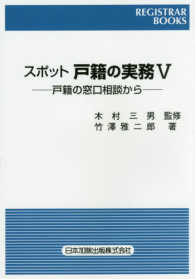Full Description
This book introduces key underlying principles for teaching First Nations languages and language learners in schools across a range of contexts. It takes a comprehensive approach covering traditional languages, new languages, and English.
At a critical time for Indigenous languages across the globe, the United Nations Decade of Indigenous Languages (2022-2032) draws attention to the endangerment of these languages and advocates for the role of education to preserve and revitalise Indigenous languages. At the same time, many new language varieties spoken by Indigenous peoples often remain unrecognised in education systems, and their English language learning needs are left unaddressed. This book provides crucial information to enhance the reader's knowledge of these critical issues in language and education with a view to promote future action. The chapters showcase the advocacy, activism, and allyship for First Nations languages and language learners undertaken by educators, education systems, and researchers in Australia. With a practical focus, this book illustrates innovative and contemporary approaches to language learning for First Nations students; educators can use this text to guide and develop language-learning approaches in their respective contexts.
This is a foundational resource for both Indigenous and non-Indigenous teachers and aspiring teachers alike, and all education professionals who appreciate the fundamental importance of language in education.
Contents
Introduction
Part One: Contexts, Theories, Principles, Practices and Protocols for Language Learning and Teaching in Schools
1. Language Learning in Schools: Contexts, Theories and Practice
2. Consent, Copyright, Consultation, Collaboration and Co-design: Principles & Protocols for Developing School Language Programs
Part Two: Learning and Teaching Traditional Aboriginal and Torres Strait Islander Languages in Schools
3. Teaching Aboriginal Languages as First Languages in the Northern Territory: Reflections of Educators in the Warlpiri Triangle and Yolŋu Communities
4. Teaching First Nations Languages in Queensland Schools
5. Western Australia Department of Education, Aboriginal Languages Teaching Training Course
6. The Journey to the Opening of Gumbaynggirr Giingana Freedom School
Part Three: Aboriginal and Torres Strait Islander Contact Languages in Education
7. The Diverse Indigenous Creole Languages and First Nations Language Repertoires in Queensland, with Information for Educators
8. Kriol in the Northern Territory
9. Aboriginal English in Education
Part Four: Learning and Teaching the Curriculum through Aboriginal and Torres Strait Islander Languages
10. Gija Curriculum at Purnululu School
11. Content Language Integrated Learning (CLIL) for Learning Aboriginal and Torres Strait Islander Languages
Part Five: Learning, Teaching and Assessing Learning in Standard Australian English for Speakers of Aboriginal and Torres Strait Islander Languages
12. Aboriginal and Torres Strait Islander Students' Language and Learning through a Both Ways Approach
13. Aboriginal and Torres Strait Islander Students' Language Learning for Literacy Development
14. Understanding the EAL/D Extra: Assessing English as an Additional Language or Dialect in First Nations Contexts
Conclusion







